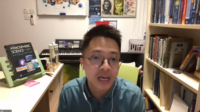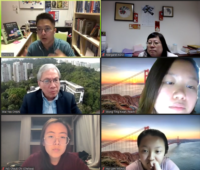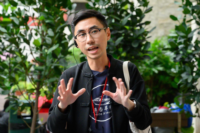|
Air Pollution and Our Food: How Do They Affect Each Other?
An online Night Talk was given by Prof Amos TAI, Associate Professor, Earth System Science on 23 February 2021, about how air pollution and food production interrelate with each other, and how individuals can help address air pollution and global warming by changing our eating habits.
Prof TAI introduced some common air pollutants, such as ozone and ammonia, and how they, together with global warming, damage plants and reduce crop yields in the world. Meanwhile, modern agricultural activities that use plenty of chemical fertilizers and pesticides intensify air pollution. Due to the growth in world population and their affluence, there has been a significant increase in the demand for meat. To produce more livestock, more chemical fertilizers and pesticides are applied to boost production of fodder crops, which further aggravates air pollution. Prof TAI concluded that as global citizens, we can change our food consumption pattern, from a meat-intensive diet to a more plant-based diet, to help mitigate the negative environmental impacts brought about by the agricultural sector.
Customs of Traditional Festivals in the New Territories
The College was honoured to have engaged Mr George WAN, co-founder of the cultural organisation Hide and Seek Tour, through the connection of Prof Amos TAI, College Fellow, to give an online Night Talk on 19 March 2021. It aimed to introduce participants to interesting stories and the cultural spirit behind the customs and traditions practised in rural villages in the New Territories during some traditional festivals. A live transcript translated in English was provided by Prof TAI for non-Cantonese speakers.
As an introduction, Mr WAN briefly explained some historical reasons why many unique traditional cultures and festivities can be preserved in the New Territories, unlike on Hong Kong Island or in Kowloon. He then shared the origins of some traditional festivals, for example, Tin Hau Festival and Jiao Festival. The former celebrates the birthday of the Chinese Goddess of the Sea. It was believed that before she became a deity, she had been a versatile lady who could accurately forecast weather changes with her magical powers, and therefore saved the lives of many fishermen from stormy seas. After her death, it was seen that she ascended to the heaven. Jiao Festival is to show our gratitude to gods for their protection, and to plead for their continuous blessings. With the display of many precious photos taken during his field trips, Mr WAN also described some festive customs in detail, such as the implications of some movements of Chinese unicorns in a Hakka Chinese unicorn dance, and the steps of a lantern lighting ceremony, which celebrates the birth of a baby boy.
The talk drew almost 20 students and teachers. They enjoyed the talk a lot and looked forward to the next one.
|





















